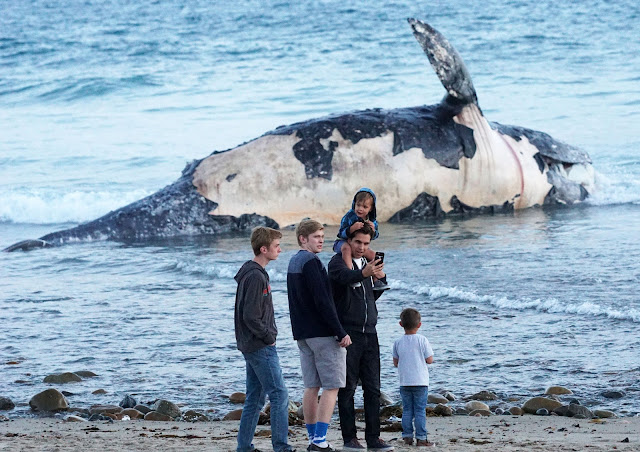Image from the NYT. This dead whale on a California beach and the man taking a selfie in front of it symbolizes the war of humans on whales. The whales lost in what was probably the largest extermination of a non-human species in history. You'll find more details on this epic story in the upcoming book by Ugo Bardi and Ilaria Perissi "The Empty Sea" to be published by Springer
With the start of the 19th century (according to the human calendar), the lines were drawn: the two major vertebrate groups on Earth were squaring off against each other. On one side, the homo sapiens, the last survivor of the hominin genus, a bipedal primate with remarkable technical abilities. On the other side, the 89 species of the Cetacea order, known to humans as "whales," large aquatic animals that dominated the marine trophic chain.
When the war began, there were some 4 million whales in the Earth's ocean, for a total mass of some 120 million tons. On land, humans numbered about one billion individuals, but their total mass was less than 100 million tons. It looked like a fair fight but, in reality, the whales never had a chance.
The whales probably never understood what befell them: their powerful sonar systems worked only underwater and couldn't tell them of the menace that was coming from above the surface. Their sophisticated brains were unable to devise strategies to fight a threat that they had never faced in the tens of millions of years of their existence. Their stupendous bodies weighing tens of tons were of no use against small creatures using super-charged metabolic mechanisms. Their magnificent insulation system, that humans called the "blubber," made whales able to survive in icy waters but it was blubber that sent whales in hyperthermia when they tried to swim away from their human nemesis.
Image from Christensen 2006- The Y-scale reports the estimated total mass of whales in the Earth's oceans. The X-scale goes from 1800 to 2000. It is a "Seneca Cliff," typical of the overexploitation of economic resources.
It was a war of extermination. In quantitative terms, it was possibly the largest extermination of a non-human species carried out by humans over their existence. And also the fastest one: commercial whaling started in the early 19th century, by the late 20th century it was basically over and the true collapse of the whale populations had lasted no more than a few decades. Afterward, one whale in four was still alive, and the large ones had been wiped out. Maybe 20 Million tons of whales remained out of an initial total of some 120 million. Whales are still hunted and killed, nowadays, although pollution and the keel of boats may be more effective extermination weapons than harpoons used to be (but harpoons are still used, too).
It is done, now, and the ocean is bereft of whales: it is not the same ocean anymore. Humans are clever monkeys and they are good hunters, but they don't understand the results of their actions. Everything on this planet is connected and it is well known in biology that you can't do just one thing. So, the elimination of the top of the marine trophic chain is going to have unpredictable and probably disastrous effects on the whole ecosphere -- it will also have bad effects on the stability of the Earth's climate.
Some humans understand the danger of what they did, but most of them don't and don't care. They seem to think that exterminating whales is a right given to them by their God (maybe an evil deity going under the sacred name of MSY - maximum sustainable yield). About what the whales may have thought of their disgrace, we'll never know. But, if whales have a God or a Goddess, there may come a time for revenge, and humans will fully deserve whatever befalls them.
h/t Daniel Pauly

